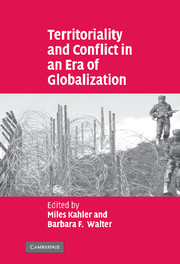Book contents
- Frontmatter
- Contents
- List of figures
- List of tables
- List of contributors
- Acknowledgments
- 1 Territoriality and conflict in an era of globalization
- Part I Territorial attachment and detachment
- 2 Bounded communities: territoriality, territorial attachment, and conflict
- 3 On giving ground: globalization, religion, and territorial detachment in a Papua New Guinea society
- 4 The resilience of territorial conflict in an era of globalization
- 5 Diasporas and homeland conflict
- Part II Territorial stakes and violent conflict
- Part III Territorial regimes in an era of globalization
- Conclusion
- References
- Index
2 - Bounded communities: territoriality, territorial attachment, and conflict
Published online by Cambridge University Press: 22 September 2009
- Frontmatter
- Contents
- List of figures
- List of tables
- List of contributors
- Acknowledgments
- 1 Territoriality and conflict in an era of globalization
- Part I Territorial attachment and detachment
- 2 Bounded communities: territoriality, territorial attachment, and conflict
- 3 On giving ground: globalization, religion, and territorial detachment in a Papua New Guinea society
- 4 The resilience of territorial conflict in an era of globalization
- 5 Diasporas and homeland conflict
- Part II Territorial stakes and violent conflict
- Part III Territorial regimes in an era of globalization
- Conclusion
- References
- Index
Summary
Introduction
In the first half of the twentieth century the study of territory and its role in international politics was very much in fashion among political scientists. Since then, however, the study of territory has lost much of its appeal among political scientists and has largely (but not completely) been left to political geographers. In the last decade or so, however, territory and territoriality have received renewed attention among political scientists. It should not be surprising that scholars in international relations have been at the forefront of this renewed attention to territory and territoriality. The importance of territory has long been recognized in the origins and escalation of disputes between states. Nonetheless, only recently have scholars who put territory front and center in their study of international conflict revealed that disputes over territory are more likely to escalate to war than any other type of dispute (Huth 1996; Diehl 1999b). The importance of territoriality – exclusion by area (Sack 1986) – is less well understood among political scientists, but it seems that some scholars have begun to recognize that territoriality is a, if not the, fundamental ordering principle of the modern state system (see Spruyt 1994; Wagner 2004). The third main concept discussed in this volume, “globalization,” has received much attention in recent years precisely because it seems to challenge this fundamental ordering principle of the modern state system. Globalization proposes that exclusion by area loses its importance in “a world of flows.”
- Type
- Chapter
- Information
- Territoriality and Conflict in an Era of Globalization , pp. 25 - 61Publisher: Cambridge University PressPrint publication year: 2006
- 37
- Cited by

